Episode 96: Exploring Rachel Carson’s Life and The Divestment Movement + Episode 97: Crafting Compelling Personal Climate Change Stories + Episode 98: Rebels or Advocates? Dana R. Fisher on the Future of Climate Change Action
Episode 96: Exploring Rachel Carson’s Life and The Divestment Movement
In this episode of Citizens’ Climate Radio, hosts Horace Mo and Erica Valdez bring together diverse voices to discuss current efforts to address climate change. Horace Mo speaks with Ann E. Burg, a celebrated author known for compelling historical novels for young readers, about her newly published novel, “Force of Nature–A Novel of Rachel Carson,“ which opens a new door for readers to experience the life of Carson, a well-known environmental pioneer in the U.S., by reading her field notes and Ann’s innovative writing.
Erica Valdez discusses the American fossil fuel divestment movement, highlighting the work of younger generations. She has a conversation with Aly Horton, another student taking the initiative to promote the fossil fuel divestment movement on their campus at Northern Arizona University.
In the Resilience Corner, Tamara Staton speaks on mastering the banjo and how this uniquely relates to addressing climate change. Finally, we have a Good News story from Peterson Toscano regarding South Africa’s energy supply.
Ann E. Burg Explores Rachel Carson’s Life
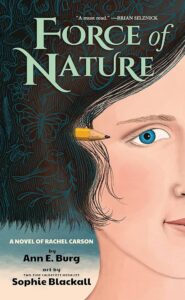 In this episode, author Ann E. Burg dives into her latest work, “Force of Nature.” This novel is inspired by Rachel Carson’s groundbreaking environmental book Silent Spring. It is beautifully illustrated by Sophie Blackall.
In this episode, author Ann E. Burg dives into her latest work, “Force of Nature.” This novel is inspired by Rachel Carson’s groundbreaking environmental book Silent Spring. It is beautifully illustrated by Sophie Blackall.
After World War II, DDT became a common pesticide in neighborhoods and farms; however, it had dire consequences for ecosystems, entering the food chain and harming various species. This alarming situation inspired Rachel Carson to write and publish her now-famous book, “Silent Spring”, in 1962. Ann E Burg tells us how Carson’s book “explored DDT but also started with a fable for tomorrow. It suggested what life would be like if spring came and no birds were there to sing.”
Ann E. Burg considers Rachel Carson a role model for her scientific rigor and environmental advocacy. Carson’s ability to illuminate the beauty and complexity of nature-inspired Burg to see the world differently. This novel, “Force of Nature,” is not merely a recounting of Carson’s life but an immersive experience of her world. Burg hopes readers will see the world through Carson’s eyes and appreciate the interconnectedness of all life.
About Ann E. Burg
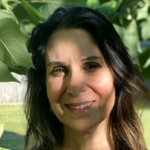
Ann Burg
Ann E. Burg’s debut novel, “All the Broken Pieces,” was named an ALA Best Book for Young Adults, a Jefferson Cup award winner, and an IRA Notable Book for a Global Society, among its many honors. Her subsequent novels in verse have garnered multiple awards and starred reviews. “Serafina’s Promise” was named an ALA Notable, a Parents’ Choice Gold Award Winner, and an NAACP Image Award finalist. “Unbound“ won the New York Historical Society Children’s History Book Prize, the Christopher Award, and an Arnold Adoff Poetry Honor. “Flooded–A Requiem for Johnstown” was a Bank Street College Claudia Lewis Award winner, a Bank Street College Best Children’s Book (with outstanding merit), and a Junior Library Guild selection. Before becoming a full-time writer, Burg worked as an English teacher for ten years. She lives in Rhinebeck, New York, with her family. To learn more about Ann E. Burg, visit her online at anneburg.com
The Student-Led Drive for Fossil Fuel Divestment
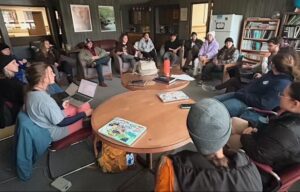 Erica Valdez discusses the fossil fuel divestment movement, highlighting the efforts on her campus, Northern Arizona University (NAU). Climate change is a human-caused phenomenon in which the fossil fuel industry plays a significant role. Erica dives into what divestment is and how it may be one of the most effective steps that institutions can take to slow climate change.
Erica Valdez discusses the fossil fuel divestment movement, highlighting the efforts on her campus, Northern Arizona University (NAU). Climate change is a human-caused phenomenon in which the fossil fuel industry plays a significant role. Erica dives into what divestment is and how it may be one of the most effective steps that institutions can take to slow climate change.
Erica invites Aly Horton, president of Fossil Free NAU, a student-led group demanding complete divestment. Aly explains the club’s efforts and goals to hold the university accountable to its environmental commitments.
Aly and Erica also discuss recent pushback from the university administration. Nevertheless, Fossil Free NAU remains determined to continue its mission because it is just a small chapter of an international movement. Although it may be difficult, many institutions have already divested from fossil fuels. Aly shares inspiring advice to organizers worldwide who are working towards divestment.
Listen Now!
Resilience Corner
For this month’s Resilience Corner, Tamara Staton draws parallels between her desire to master the banjo and the overwhelming task of addressing climate change. When practicing banjo, she faces common emotional barriers like fear, perfectionism, imposter syndrome, and information overload. We also face these barriers when we talk about climate change. Tamara discusses why it is important to recognize these feelings, encouraging listeners to embrace imperfections and persistent efforts.
To learn more about building resilience in the face of climate challenges, visit the Resilience Hub. You can also email Tamara at radio @ citizensclimate.org or text or leave a message at 619-512-9646.
Good News!
Peterson Toscano shares a good news story from Limpopo Province, South Africa, where earlier this month he was staying in a game reserve. He reflects on the progress in South Africa’s energy sector since his previous stay, highlighting the severe scheduled power outages known as load-shedding issues caused by unreliable coal-powered plants. He notes that significant changes have occurred since President Cyril Ramaphosa raised the licensing threshold for private power generation, leading to over 1,000 registered renewable energy projects. These projects, primarily solar and wind, are now providing nearly 4,500 megawatts of new capacity, significantly reducing power outages and transforming the country’s energy landscape.
Take a Meaningful Next Step
Each month, we will suggest meaningful, achievable, and measurable next steps for you to consider. We recognize that action is an antidote to despair. If you are struggling with what you can do, visit our Action Page.
Episode 97: Crafting Compelling Personal Climate Change Stories
In this month’s Citizens’ Climate Radio episode, host Peterson Toscano and the CCR teams introduce a fresh approach to climate change storytelling by exploring personal stories as metaphors. While these stories are not explicitly about climate change, they reveal truths and perspectives that resonate with our climate work. Join us to discover how personal narratives can enhance and diversify our stories about climate change. You will also learn expert storytelling tips to apply when telling stories about climate change.
Using Personal Stories as Metaphors
Peterson challenges us to use personal stories, which hold significant meaning and energy for us, as metaphors for climate change. These stories, often about transitions, conflicts, or breakthroughs in our lives, can draw powerful parallels to our climate efforts. You’ll hear two compelling stories from the Citizens’ Climate Radio team members Erica Valdez and Horace Mo, each reflecting personal growth and resilience.
Horace’s Story: A Journey of Friendship and Belonging
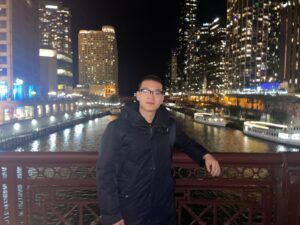 Horace Mo shares his experience of moving from China to the USA as a 16-year-old. Navigating a new culture and language, Horace found support and friendship in his roommate Kai, who helped him overcome language barriers and cultural differences. This story of adaptation and support mirrors the collective effort needed in climate work, emphasizing the importance of community and mutual aid. Horace reflects, “My English ability soared like a rocket with the help of Kai and other students at school. For the first time, I sensed a personal belonging to the school community.”
Horace Mo shares his experience of moving from China to the USA as a 16-year-old. Navigating a new culture and language, Horace found support and friendship in his roommate Kai, who helped him overcome language barriers and cultural differences. This story of adaptation and support mirrors the collective effort needed in climate work, emphasizing the importance of community and mutual aid. Horace reflects, “My English ability soared like a rocket with the help of Kai and other students at school. For the first time, I sensed a personal belonging to the school community.”
Erica’s Story: Confronting Hidden Challenges
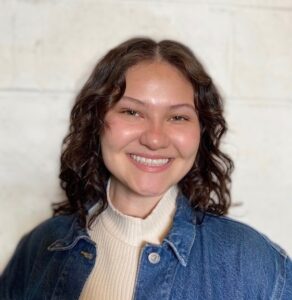 Erica Valdez recounts her high school friend Sophia’s (not her real name) struggles with college applications due to her parents’ undocumented status. Erica’s story highlights the hidden challenges marginalized communities face, drawing a parallel to the often-overlooked impacts of climate change on vulnerable populations. It emphasizes the need for empathy and support in both personal and climate-related contexts. Erica notes, “Witnessing her stress made me ask, how many people are going through something similar?”
Erica Valdez recounts her high school friend Sophia’s (not her real name) struggles with college applications due to her parents’ undocumented status. Erica’s story highlights the hidden challenges marginalized communities face, drawing a parallel to the often-overlooked impacts of climate change on vulnerable populations. It emphasizes the need for empathy and support in both personal and climate-related contexts. Erica notes, “Witnessing her stress made me ask, how many people are going through something similar?”
Making Climate Connections
Peterson tells a story about a toxic, abusive relationship and reveals how this personal relationship mirrors society’s relationship with fossil fuels. He also encourages listeners to see the climate connections in Horace’s and Erica’s stories. Both narratives reflect themes of fear, support, and overcoming obstacles—common experiences in the climate movement. We can create more relatable and engaging narratives that resonate with diverse audiences by relating personal stories to climate issues. Peterson emphasizes,
We need stories that reveal the power of climate change solutions. We need stories that unveil the driving force behind our efforts in addressing climate change. We need stories that unveil the driving force behind our efforts in addressing climate change. Stores that unearth how climate change affects some people differently than others. Stories that will inspire us to keep going.
Nerd Corner: The Economic Impact of Climate Change
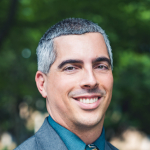 In the Nerd Corner, Citizens’ Climate Research Coordinator Dana Nuccitelli discusses the economic impacts of climate change. Using lizards as an analogy, Dana explains how extreme weather events and shifting climates can stunt economic growth, emphasizing the urgent need for swift climate action to mitigate these effects. Dana states, “Most economists agree the faster we act on climate change, the better it will be for the economy. That’s especially true if we use a market-based solution like putting a price on carbon pollution. That way, we can see the true price of products, including their climate costs, like a chameleon turning off its camouflage.”
In the Nerd Corner, Citizens’ Climate Research Coordinator Dana Nuccitelli discusses the economic impacts of climate change. Using lizards as an analogy, Dana explains how extreme weather events and shifting climates can stunt economic growth, emphasizing the urgent need for swift climate action to mitigate these effects. Dana states, “Most economists agree the faster we act on climate change, the better it will be for the economy. That’s especially true if we use a market-based solution like putting a price on carbon pollution. That way, we can see the true price of products, including their climate costs, like a chameleon turning off its camouflage.”
Listen Now
Why Climate? Featuring James Earl Hollywood III
In the new segment, Why Climate?, volunteer James Earl Hollywood III shares his motivation for climate action. A father of nine from Maryland, James highlights how environmental degradation disproportionately affects marginalized communities and underscores the importance of inclusive and collaborative climate solutions. James shares, “Climate change is not just an environmental issue; it’s a human rights issue that affects every aspect of my life.”
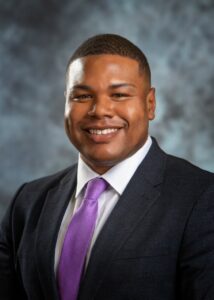 About James
About James
James Earl Hollywood III is a dedicated husband, father of nine, minister, and author with a deep commitment to social change and community empowerment. He is pursuing a doctorate in Social Leadership, combining his extensive academic background in Criminology, Public Administration, Communications, and Implementation Science with his passion for advocacy and leadership.
James has been actively involved with organizations such as the Citizens’ Climate Lobby, Americans for Prosperity, and various advisory groups, leveraging his expertise to drive meaningful change. Known for his dynamic leadership and ability to inspire others, James continues to make a positive impact through his work, striving to create a better, more equitable future for all.
If you want to share with us why you work on climate change, let us know. Contact details below.
Good News: CCL’s Successful Climate Conversations Campaign
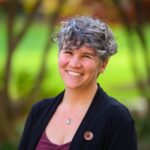 Tamara Staton, CCL’s Education and Resilience Coordinator, reports on the success of CCL’s recent campaign, which sparked over 27,000 climate conversations across all 50 states. This grassroots effort demonstrates the power of personal engagement in driving climate action and raising awareness. Tamara concludes, “Each conversation is a step towards greater awareness and collective action.” Read more about how CCL volunteers are breaking the silence around climate change. Find out about other actions and monthly campaigns by visiting CCLUSA.org/action.
Tamara Staton, CCL’s Education and Resilience Coordinator, reports on the success of CCL’s recent campaign, which sparked over 27,000 climate conversations across all 50 states. This grassroots effort demonstrates the power of personal engagement in driving climate action and raising awareness. Tamara concludes, “Each conversation is a step towards greater awareness and collective action.” Read more about how CCL volunteers are breaking the silence around climate change. Find out about other actions and monthly campaigns by visiting CCLUSA.org/action.
Stay Connected and Share Your Story
Peterson invites listeners to share their personal stories and how they connect to climate change. Whether through social media, public speaking, or personal conversations, sharing these narratives can inspire and motivate others in the climate movement. Consider submitting your story to Citizens Climate Radio. See contact details below.
Episode 98: Rebels or Advocates? Dana R. Fisher on the Future of Climate Change Action
Angry and Ready: Dana R. Fisher’s Climate Call to Action
In this month’s Citizens’ Climate Radio, host Peterson Toscano introduces listeners to the fiery and determined voice of Dana R. Fisher, a veteran in the climate change movement with nearly 30 years of experience. Fisher, the author of “Saving Ourselves: From Climate Shocks to Climate Action,” delivers a searing critique of the fossil fuel industry and the ineffectiveness of incremental policy changes. This episode challenges listeners to consider the strategies needed to combat climate change and our roles in this fight.
Dana R. Fisher: The Voice of Urgency
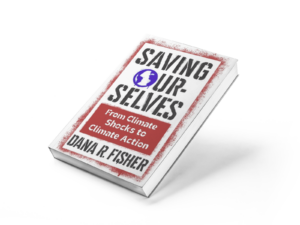 Fisher doesn’t hold back as she reads from her latest book, calling out the covert interference of fossil fuel industries in IPCC reports and the lack of robust action from elected officials. Fisher argues that while volunteer advocacy is valuable, it’s not enough. She calls for a shift from incremental change to systemic overhauls, pushing citizens to become “troublemaking rebels” to force the hand of those in power. “Incremental policymaking is going to be the death of us all,” Fisher warns, urging the need for more aggressive and organized activism. She emphasizes that the timeline of the climate crisis is not dictated by political cycles but by the rapidly accumulating greenhouse gases in our atmosphere.
Fisher doesn’t hold back as she reads from her latest book, calling out the covert interference of fossil fuel industries in IPCC reports and the lack of robust action from elected officials. Fisher argues that while volunteer advocacy is valuable, it’s not enough. She calls for a shift from incremental change to systemic overhauls, pushing citizens to become “troublemaking rebels” to force the hand of those in power. “Incremental policymaking is going to be the death of us all,” Fisher warns, urging the need for more aggressive and organized activism. She emphasizes that the timeline of the climate crisis is not dictated by political cycles but by the rapidly accumulating greenhouse gases in our atmosphere.
Rebels, Advocates, Helpers, and Organizers: We Need Them All
Drawing from discussions from Episode 93, Peterson revisits the four roles change-makers play: advocates, rebels, helpers, and organizers. While most Citizens’ Climate Lobby volunteers fit the advocate role, Fisher stresses the need for more rebels and organizers to amplify the pressure on decision-makers. Fisher’s call to action is clear: systemic change requires bold, sometimes uncomfortable actions. Peterson admits to his own discomfort with disruptive demonstrations but acknowledges their necessity in the broader strategy for climate action. “While I deeply respect the work of groups like Citizens’ Climate Lobby, it’s clear that advocacy alone isn’t enough. We need more rebels, more organizers, and more systemic change to truly address the climate crisis.” –Dana R. Fisher. About Dana R. Fisher 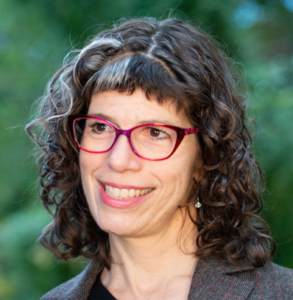 Dana R. Fisher is the Director of the Center for Environment, Community, & Equity (CECE) and a Professor in the School of International Service at American University. Her current projects include evaluating how federal service corps programs expand their climate-related work. Fisher is a nonresident senior fellow in the governance studies program at The Brookings Institution and the chair of the political sociology section of the American Sociological Association. She was a Contributing Author for Working Group 3 of the Intergovernmental Panel on Climate Change’s Sixth Assessment Review (IPCC AR6), writing about citizen engagement and civic activism. Her media appearances include ABC, CBS, CNN, MSNBC, PBS Newshour, and various programs on NPR, BBC, and CBC. Her words have appeared in the popular media, including the Washington Post, Slate, TIME Magazine, Politico, the Nation, and the American Prospect. Dana earned her undergraduate degree from Princeton University and a Ph.D. in Sociology from the University of Wisconsin, Madison. She has authored over eighty research papers and book chapters and has written seven books. For more details, see www.danarfisher.com. Follow Dana R. Fisher on TikTok, X, Instagram, BlueSky, Threads, and LinkedIn.
Dana R. Fisher is the Director of the Center for Environment, Community, & Equity (CECE) and a Professor in the School of International Service at American University. Her current projects include evaluating how federal service corps programs expand their climate-related work. Fisher is a nonresident senior fellow in the governance studies program at The Brookings Institution and the chair of the political sociology section of the American Sociological Association. She was a Contributing Author for Working Group 3 of the Intergovernmental Panel on Climate Change’s Sixth Assessment Review (IPCC AR6), writing about citizen engagement and civic activism. Her media appearances include ABC, CBS, CNN, MSNBC, PBS Newshour, and various programs on NPR, BBC, and CBC. Her words have appeared in the popular media, including the Washington Post, Slate, TIME Magazine, Politico, the Nation, and the American Prospect. Dana earned her undergraduate degree from Princeton University and a Ph.D. in Sociology from the University of Wisconsin, Madison. She has authored over eighty research papers and book chapters and has written seven books. For more details, see www.danarfisher.com. Follow Dana R. Fisher on TikTok, X, Instagram, BlueSky, Threads, and LinkedIn.
Listen Now!

Good News: Bipartisan Success on Energy Permitting Reform
“The Energy Permitting Reform Act stands out as a beacon of cooperation in a divided political climate, offering real hope that we can accelerate the transition to a cleaner energy future.” –Peterson Toscano Peterson shares a rare piece of bipartisan good news. The U.S. Senate Committee on Energy and Natural Resources has advanced the Energy Permitting Reform Act with overwhelming support. This bill, which aims to streamline the permitting process for green energy projects, marks a significant step forward in building a sustainable energy infrastructure in the United States. The bipartisan nature of this success serves as a hopeful reminder that cooperation is still possible in the fight against climate change. Learn more about Permitting Reform.
Why Climate? Featuring Dalton Jackson
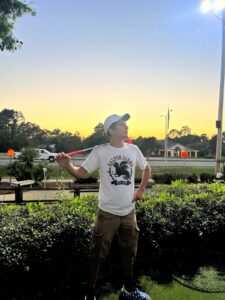 In this episode’s Why Climate? segment, Dalton Jackson, a college senior from rural Indiana who is working on conservative outreach with Citizens’ Climate Lobby, shares how growing up on a farm and learning about engines sparked his interest in climate change, particularly the importance of transitioning to sustainable energy sources. “Just because someone is conservative doesn’t mean they don’t care about climate change. It’s about showing them the benefits—economic and beyond.” –Dalton Jackson. Dalton emphasizes that convincing conservatives to engage in climate action often requires focusing on the economic benefits rather than solely the environmental impacts. He believes that more conservatives can be brought into the climate conversation by highlighting the cost savings and economic opportunities of clean energy. Dalton’s story is a powerful reminder that climate action can resonate across political divides when framed in terms of different values and priorities. Learn more about CCL Conservative at CCLUSA.org/Conservatives.
In this episode’s Why Climate? segment, Dalton Jackson, a college senior from rural Indiana who is working on conservative outreach with Citizens’ Climate Lobby, shares how growing up on a farm and learning about engines sparked his interest in climate change, particularly the importance of transitioning to sustainable energy sources. “Just because someone is conservative doesn’t mean they don’t care about climate change. It’s about showing them the benefits—economic and beyond.” –Dalton Jackson. Dalton emphasizes that convincing conservatives to engage in climate action often requires focusing on the economic benefits rather than solely the environmental impacts. He believes that more conservatives can be brought into the climate conversation by highlighting the cost savings and economic opportunities of clean energy. Dalton’s story is a powerful reminder that climate action can resonate across political divides when framed in terms of different values and priorities. Learn more about CCL Conservative at CCLUSA.org/Conservatives.
Youth Corner: The Climate GOAT Campaign
 In this episode’s CCL Youth Corner, Veda Ganesan introduces the Climate GOAT Campaign, a youth-driven initiative to make climate action a voting priority. The campaign focuses on relational organizing and deep canvassing, encouraging young people to engage their communities in meaningful conversations about the climate crisis. “It’s time for the leaders of the next generation to step up. Are you ready to use your voice to get climate action on the ballot?” –Veda Ganesan. Learn more about CCL Youth and the GOAT Campaign at CCLUSA.org/Youth
In this episode’s CCL Youth Corner, Veda Ganesan introduces the Climate GOAT Campaign, a youth-driven initiative to make climate action a voting priority. The campaign focuses on relational organizing and deep canvassing, encouraging young people to engage their communities in meaningful conversations about the climate crisis. “It’s time for the leaders of the next generation to step up. Are you ready to use your voice to get climate action on the ballot?” –Veda Ganesan. Learn more about CCL Youth and the GOAT Campaign at CCLUSA.org/Youth
Resilience Corner: Self-Care in Climate Work
 “I know what I need to do for self-care, but so often, I ignore that inner voice. It’s a constant battle between pushing through and taking the break I desperately need.” –Tamara Staton. Tamara Staton returns with the Resilience Corner, reflecting on the challenges of integrating self-care into climate activism. Staton discusses the internal conflicts many climate activists face when prioritizing personal well-being and offers strategies for maintaining resilience in the face of overwhelming challenges. Find out more about building resilience in your climate change work by visiting CCLUSA.org/resilience.
“I know what I need to do for self-care, but so often, I ignore that inner voice. It’s a constant battle between pushing through and taking the break I desperately need.” –Tamara Staton. Tamara Staton returns with the Resilience Corner, reflecting on the challenges of integrating self-care into climate activism. Staton discusses the internal conflicts many climate activists face when prioritizing personal well-being and offers strategies for maintaining resilience in the face of overwhelming challenges. Find out more about building resilience in your climate change work by visiting CCLUSA.org/resilience.
Looking Ahead: Hot Mess – A True Crime Climate Mini-Series
 You will hear about Hot Mess: How Climate Consensus Turned into Political Chaos, a new five-part mini-series exploring the rise and fall of bipartisan climate action in the U.S. This series promises to uncover the twists, turns, and missed opportunities in American climate politics, featuring insights from notable figures like former U.S. Representative Bob Inglis and Chelsea Henderson, host of RepublicEn’s EcoRight Speaks podcast. She is also the author of Glacial: The Inside Story of Climate Politics. Plus, Katie Zakrzewski from Green Tea Party Radio, who appeared on Episode 89 of Citizens’ Climate Radio, will join the conversation. Hot Mess: How Climate Consensus Turned into Political Chaos will appear in the same podcast feed as Citizens’ Climate Radio and premiere in October 2024. Take the Next Step: Get Involved Feeling inspired by what you heard in this episode? The next step is to take action. Whether you’re passionate about advocacy and organizing or simply want to learn more about how you can contribute to the climate movement, there’s a place for you. Join thousands of others who are making a difference.
You will hear about Hot Mess: How Climate Consensus Turned into Political Chaos, a new five-part mini-series exploring the rise and fall of bipartisan climate action in the U.S. This series promises to uncover the twists, turns, and missed opportunities in American climate politics, featuring insights from notable figures like former U.S. Representative Bob Inglis and Chelsea Henderson, host of RepublicEn’s EcoRight Speaks podcast. She is also the author of Glacial: The Inside Story of Climate Politics. Plus, Katie Zakrzewski from Green Tea Party Radio, who appeared on Episode 89 of Citizens’ Climate Radio, will join the conversation. Hot Mess: How Climate Consensus Turned into Political Chaos will appear in the same podcast feed as Citizens’ Climate Radio and premiere in October 2024. Take the Next Step: Get Involved Feeling inspired by what you heard in this episode? The next step is to take action. Whether you’re passionate about advocacy and organizing or simply want to learn more about how you can contribute to the climate movement, there’s a place for you. Join thousands of others who are making a difference.
- For general actions and campaigns, Visit www.cclusa.org/action to explore current campaigns, find practical steps you can take today, and become part of a growing community committed to creating a sustainable future.
- For college students: Check out cclusa.org/highered to discover opportunities for engagement and leadership in climate action on your campus.
- For middle and high school students: Visit cclusa.org/youth to get involved in youth-led initiatives and make your voice heard on climate issues.
Listener Survey
We want to hear your feedback about this episode. Please fill out our short survey. Join the Conversation Engage with other listeners and share your thoughts on our social media channels. Follow and connect with us on X, Instagram, LinkedIn, Facebook, and TikTok. We Want to Hear from You
- Email: radio @ citizensclimate.org
- Text/Voicemail: 619-512-9646 (+1 if calling from outside the USA.)
Recent Posts
